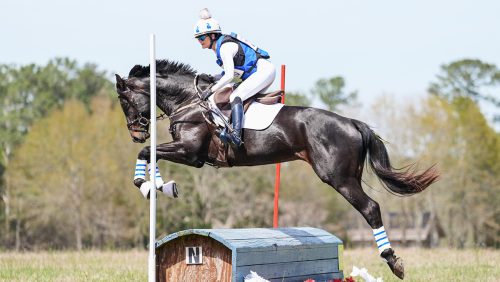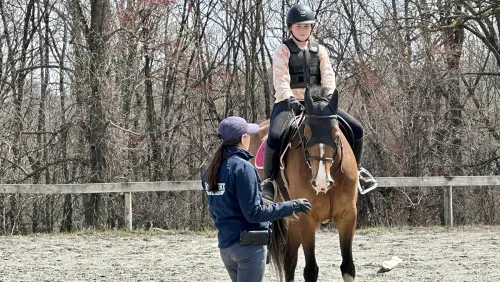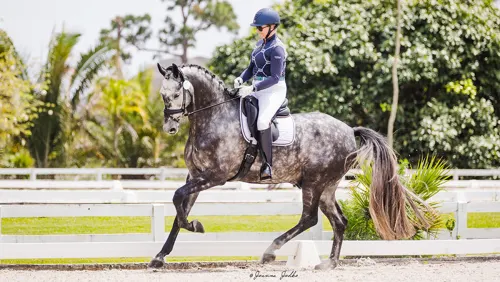Six weeks ago, I pushed my accounting work aside, frustrated that I couldn’t concentrate. A couple weeks prior, Katie Monahan Prudent had given her controversial interview, and I just couldn’t seem to let it go.
In an effort to simply clear my head so I could return to work, I decided to write a letter to her, expressing my reactions and thoughts, not intending anything but a cathartic experience. Then on a whim, I decided to send it to the Chronicle and lo and behold, they published it.
And as it turns out, my thoughts and feelings resonated with many people in our sport. As far as I can tell, my letter was shared from the Chronicle’s Facebook page over 2,000 times and garnered over 1,000 comments (via Facebook comments, posts on the Chronicle forums, and private messages). The vast majority of the feedback was not only positive, but also shared in similar stories, backgrounds, frustrations, commiserations, and encouragements.
I was overwhelmed and inspired by the reaction my letter received. I had no idea that my voice would speak for so many people. And because of that, I’m thankful to Katie Monahan Prudent. While none of us will ever know the intentions behind her words, her interview served as a catalyst for sparking a conversation that needs to be happening; for saying things that need to be said; for inspiring a movement that needs to begin.
You see, although her interview inspired my letter, 95 percent of what I wrote stands true independent of her remarks. Regardless of the target or merit of her criticisms and opinions, the reality is that reaching beyond the grassroots of this sport is entirely out of the question for most riders due to the expense, and we lack adequate programs and paths to help develop underfunded talent. While hard work certainly goes a long way, and advances some riders into the upper echelon, too many riders get stuck at the low levels or are plagued by invisibility, working as grooms and working students, regardless of how hard they work or how much heart they give.
“Hard work wasn’t going to fly me home or feed me if it didn’t pan out …In the end, hard work did not pay off and only cost me more in the end…Deep down, I still want to make it as far as I can, but reality is slowly creeping in and has me refocusing on doing the best I can.” – Laura Harris
“I got fed up with the overtime hours, the low pay, the no benefits, the way I was treated, the false promises and the lack of thank yous…I was officially burnt out. Was I supposed to put 10 years of my life into someone else’s business to do ticketed warmups on Tuesdays? Why do I keep hitting my head against a wall?” – K.L.
“I think there are a lot of people out there with knowledge and talent and work ethic and ability who are just hidden. I think to change the direction of the sport, those people need the opportunity to be out and active and have horses to ride. I had a pretty decent amount of opportunity, and I worked very hard being there all day, cleaning tack, begging to sit on anything and everything, making connections, staying out of drama, and when the little bit of money I had stopped, it was just not going to be possible for me to try to keep going.” – Catherine Miller
ADVERTISEMENT
These are just a few excerpts from stories shared with me in the days following my letter, and are from individuals who have worked for top, Olympic programs. They had hard work and they had talent, but without money, it still wasn’t enough for them to break into the top of the sport with their own riding.
Another amateur rider, who has broken into the top levels of the jumpers on her own, says:
“I am competitive and love showing, but boy, it has gotten harder and harder to fund ‘the habit’ over the years. I am really looking forward to ideas on ways that we can save this industry. I think we’re going in a really terrible direction. I can already say that I used to show with a super fun group of independent amateurs. I think I’m one of the only ones left showing out of maybe 15 or 20 of us? The rest have opted to focus on lessons and clinics and the occasional local level show because it’s so absurdly expensive to show on the circuit these days.” –Lindsey Fletcher
I could give you hundreds of other quotes from hundreds of other riders who shared similar stories and experiences. And neither my story nor theirs is about sour grapes, though some have intimated as much. Sharing the reality of our stories and the fact that hard work alone is not a guarantee (although it is touted as such) is about creating an awareness of a problem that exists in our sport.
Awareness sparks conversation, which leads to solutions. At the end of the day, regardless of whether people recognize the issues or not, our stories prove these issues exist. And we need to create an environment where the path to success and the ability to participate isn’t limited to those with extraordinary finances or good luck by providing ideas for solutions, such as sustainable programs for developing underfunded talent.
This experience has taught me two things: First, I am not alone in this sport or in my feelings. And neither are all of you. There are thousands of us—passionate, hardworking, talented, committed and struggling, grasping for every opportunity, partially buried beneath disappointment and reality but at the end of the day, still trying.
The second thing I have learned is that the greatest enemy we face isn’t our lack of funds or an exclusively expensive sport. No, our biggest enemy is inaction. It’s our willingness to believe we can’t enact change. It’s our unwillingness to do anything except complain about how things are or wish for how things could be. It’s settling for things being the way they are because that’s how it’s always been done.
You see, I was a little bit wrong in my letter. At the end of it, I said “I’m just Jennifer Baas,” implying that my perceived lack of, well, everything, meant I was powerless to enact change. And certainly, someone like Katie Prudent, with her established and respected place in this sport, has great ability to influence change and lead by example.
ADVERTISEMENT
But so do I. I stood up for what I thought just I believed, and it turns out, it served as a voice for a lot of people. And now that stand is starting to morph into the ability to affect some real change.
You see, a couple of days after my letter was published, Murray Kessler (President of U.S. Equestrian) reached out to me. Though I panicked that he was hunting me down to excommunicate me from hunter/jumper land, he had read and liked my article. He liked what I stood for, and liked that I proposed solutions instead of simply complaining. He allowed me to share feedback I had heard from all of you—our frustrations and desires to have a bigger place in this sport. And he shared with me his passion for the grassroots, as he once was a grassroots rider himself.
About a week after our initial interactions, Mr. Kessler contacted me and told me that he is launching a grassroots advisory board that will help dissect the problems facing the grassroots and help institute changes, with the goal of making our sport more accessible to all of us. He asked me to be a member of the advisory board, which will meet in Lexington, Ky., sometime this fall. Shocked, I of course accepted!
I am excited for the potential good that could come out of this advisory board and feel like having a president who recognizes the need to reinvigorate the grassroots is a huge step in the right direction.
Additionally, stemming from the realization that there are so many of us out there facing similar hurdles, I believe there is an active need to connect, equip, and support each other. Thus, I and about 12 others are in the beginning stages of identifying what it would look like to create a new organization that would specifically target the foundation level of the sport. Entirely different than a governing body like USEF or USHJA, this organization would seek to elevate riding and horsemanship, develop under-funded talent, provide more accessible opportunities through various programs, and connect all of us, so that instead of individuals scattered across the nation, we can unite as one voice and together, create some of the changes we want to see.
So although conversation on social media has died down in the past couple of weeks, behind the scenes, there’s a lot churning, and I am continually in awe of the potential. My challenge for all of you is to join me.
Instead of just thinking of how you wish things were different, think of ways those changes could be accomplished and think outside the box! Share those ideas with your friends—and share them with me! I’m committed to doing as much as I can to help further change. And here’s the big part: be willing to get involved, to act. Even small steps can make a difference. Get involved, give back, don’t just be a part of the conversation but, just as I challenged Ms. Prudent, put some skin in the game.
If all of us who share similar frustrations and goals and dreams can unite and create action, we just might be able to make a difference. Maybe not at the top. Maybe it’ll always be hard. But maybe we can change our landscape and at the very least, make it a little less lonely, a little more enjoyable, a little more hospitable to our dreams and goals.
Lastly, I want to hear from you! Please keep the conversation going. Comment or message me with any ideas you have on how we can begin changing the grassroots. Share things you and your friends are doing to help each other or ways you are giving back, as this will inspire others. And finally, please share feedback on whether an organization targeted with supporting, growing and connecting the grassroots sounds appealing and share any thoughts and ideas on what you’d like to see.















